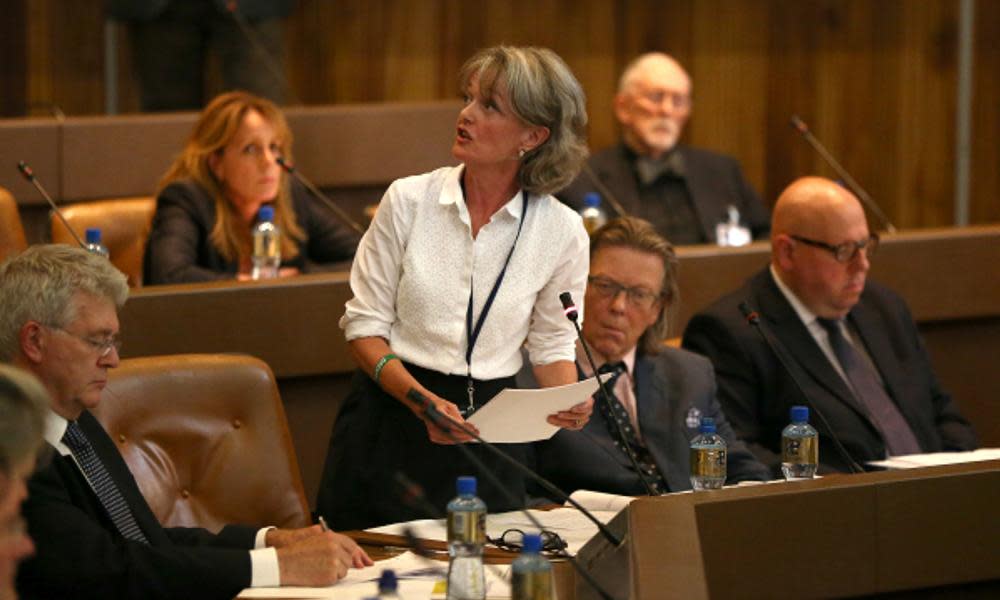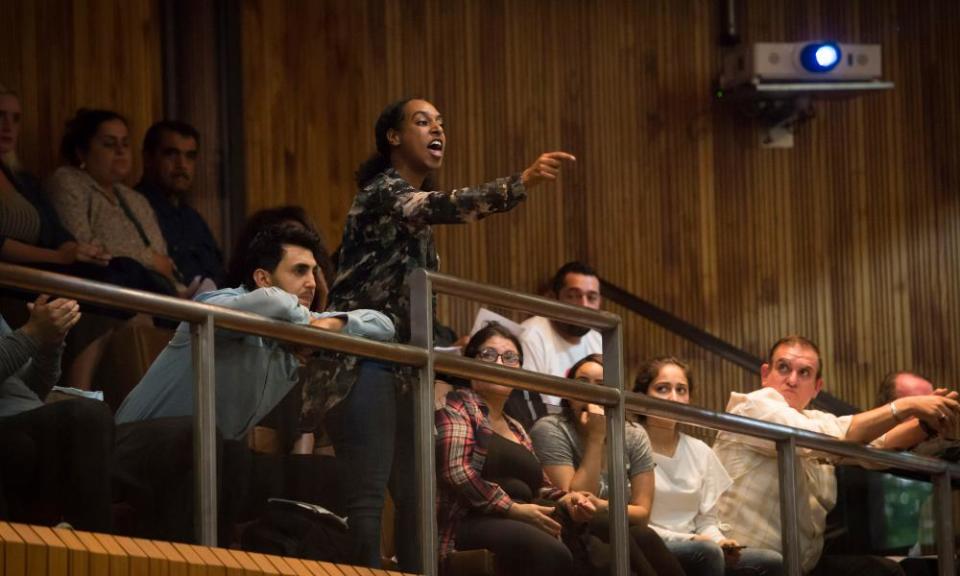New Kensington and Chelsea leader heckled by Grenfell fire survivors

The new leader of Kensington and Chelsea council has been met with shouts of disbelief and calls to resign, after she promised survivors of the Grenfell Tower fire that she would oversee fundamental cultural change among local officials and politicians.
Elizabeth Campbell was elected at a chaotic council meeting on Wednesday evening, which was dominated by emotional speeches and interruptions from scores of survivors of the fire.
Their raw fury and distress was made plain to councillors assembled in the plush chamber of the town hall, just off Kensington High Street in one of the most affluent parts of the borough.
The meeting’s agenda was swept aside as survivors took to the platform to speak of their loss and berate the council for its failures both in the run-up to the devastating blaze on 14 June and its aftermath.
A heavy security presence attempted to contain most of the survivors in the public gallery, with the door to the council chamber locked, which only served to fuel their anger.
Protests and a standoff between security guards and survivors resulted in more being allowed into the chamber.
Speeches from a string of survivors illustrated the breakdown of trust between the north Kensington community and the authorities.
Mahboubeh Jamalvatan, a resident of the 3rd floor of the tower, held up the key to her flat as she addressed councillors in Farsi through an interpreter.
“Every time I look at this key, I ask what is the difference between us human beings? We all have hearts full of love and affection.”

She added: “I beg you, do not play games with us. I beg you, do not tell us lies. I beg you, do not waste our time.”
Another survivor, Mahad Egal, accused the council of acting for political gain, of criminal acts, selfishness and disgrace.
“You’ve let the dead down. Now you’re going to come for the living? … Madam, step down and resign,” he urged Campbell.
Edward Daffern, who lived on the 16th floor and was part of the Grenfell Action Group, which warned of fire risks in the tower, said his organisation had repeatedly told the council “how you were putting our lives at risk, how you were treating us with contempt.” The council had treated tenants and action groups despicably, he said.
Others said their voices had not been heard, they could no longer trust anyone in authority and they had been treated like cattle.
Earlier, Campbell told the meeting that 400 new social housing units would be acquired or built over the next five years, including 68 homes in Kensington Row, another 31 homes bought on Wednesday, and a further 300 new social housing units to be built or purchased.
“We will not hold back from spending the borough’s reserves,” she said, referring to £274m held by the council.
She offered three commitments:
To change the culture of the council.
To listen to and support the local community.
To change the way social housing was managed.
Her speech, interrupted throughout with cries of “never”, “shame” and “liar”, ended amid loud booing.
Before Campbell was elected, the leader of the Labour group, Robert Atkinson, called for external commissioners to be brought in to run the council rather than a new leader be elected.
“Such is the anger and distrust right across this borough … that nothing the ruling Conservative group says tonight will convince the people,” he said.
Campbell was elected with the votes of Tory councillors, who form the majority, with Labour councillors voting against. Barry Quirk, the former chief executive of Lewisham council, was appointed as the chief executive of the borough.
Earlier, at a consultation hearing, Sir Martin Moore-Bick, the chairman of the public inquiry into the disaster, was repeatedly urged to ensure it considers not just the technical causes of the fire but the impact of gentrification policies in the borough.
Jules Carey, a lawyer acting for several victims said: “This was a building where a huge amount of money was spent to make it attractive, but at the same time there were naked gas pipes in that building that were creating fire risk.
“There are significant issues of discrimination and attitudes towards social housing that many people feel were involved in the investment, maintenance and the response to this disaster.”
But after the hearing, Moore-Bick told Emma Dent-Coad (Kensington’s Labour MP): “When I hear people say we should look into the social and political cultural approach to social housing, I quite understand why people think that is something that should be investigated.
“But I am not necessarily sure that is something my inquiry should do or whether some other sort of group with a different background, different skills, different training and expertise should be better placed [to do]”.
Dent-Coad, who remains the borough’s councillor representing the Grenfell residents, said later that Moore-Bick must consider gentrification.
“They were just tarting it up for people they wanted to move in because there was an estate development programme that was important to them,” she said. “They have to look at this. It is part of the decision-making process.”
Thirty-nine victims of the Grenfell Tower tragedy have now been identified with “many more” to come, the Westminster coroner said on Wednesday.
Three members of the Choukair family were among the latest victims to be named. The bodies of Bassem Choukair, 40, Mierna Choukair, 13, and Nadia Choucair, 33, were recovered from the 22nd floor of the tower, the court heard.
The remains of Gary Maunders, 57, a fourth victim to be named, were found on the 23rd floor.
All were identified through their dental records, and the provisional cause of death was given as “consistent with the effects of fire”.
Fiona Wilcox, the coroner, told the 10-minute hearing there were “still many more identifications” of those who died in the fire yet to take place. At least 80 people are thought to have been killed in the blaze.

 Yahoo News
Yahoo News 
